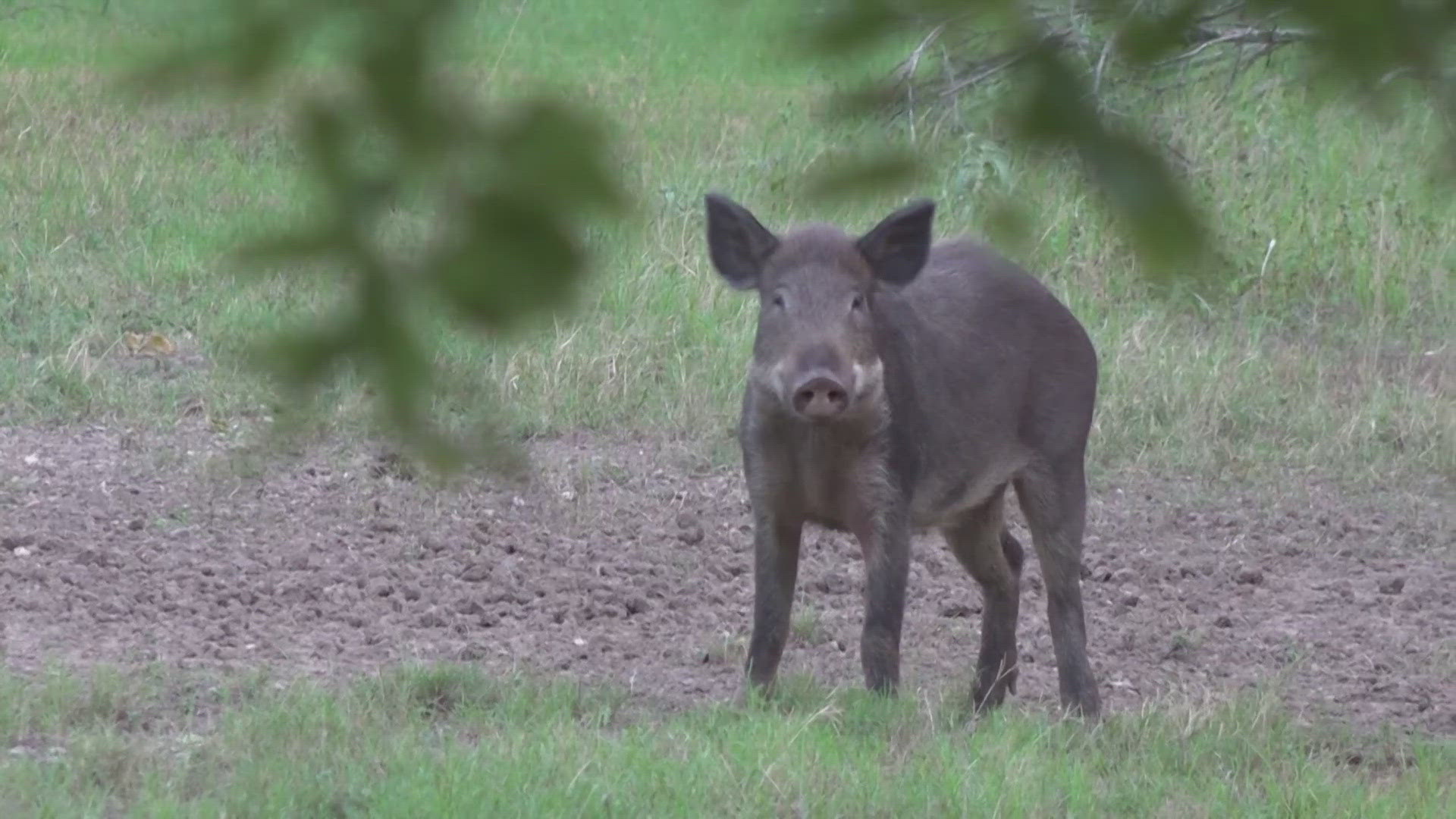SAN ANTONIO — The effort to rid the Eastwood Village area in east San Antonio of feral hogs that have been leaving the heavily wooded Salado Creek backwoods and getting into nearby backyards appears to have taken an aggressive turn.
A now-deleted social media post featured a picture of a dead hog with a caption claiming that someone had come into the area and shot the animal and removed it. San Antonio police responded to the post by saying that discharging a firearm in a municipality could be a criminal offense, depending on the totality of the circumstances.
The original social post, which appeared on the NextDoor app last week, featured a picture of about 10 small-to-medium-sized feral hogs foraging in an alley that abuts the east side of Martin Luther King Park.
The post urged area residents to be careful, which sparked a long thread of comments about how to respond to the invasive and sometimes dangerous animals.
While one man who claimed to be a bow hunter asked for directions to the site, another said he would like to come set up a trap. Another advocated for poisoning the hogs. Several wondered why the city hasn't done anything to address the issue.
And while almost everyone expressed an interest in ridding the area of hogs, at least one man who lives in the area seemed to be feeding them, saying he likes feeding birds but when he throws corn on the ground, the pigs get to it first.
The city's Parks and Recreation Department responded to the complaints by reminding residents they can call 311 if they spot one of the hogs.
"The city has a contract with a vendor to trap and remove feral hogs. If park or trail users encounter a feral hog, they are urged to keep their distance," the department wrote. "There is no city ordinance prohibiting the feeding of wildlife in San Antonio; however, feeding wildlife is discouraged."
Area residents said they are caught in a dead zone of inaction, because even though the hogs come from the park, the danger to homeowners is on nearby private property.
Officials with the city's 311 help center confirmed they only create work orders on complaints involving city land.
KENS 5 asked the Parks and Recreation Department if they have taken any steps inside the park to address the issue. We are awaiting a response.
A spokesman in the District 2 City Council office said they have received no complaints about problems in the area.
Acqunetta Drummer, who lives on the alley where the hogs are being spotted on an almost daily basis, said she has called 311 several times and seen no action.
"I think it is getting worse, yes!" she said. "Nobody with the city has been any help. They just refer me to the wildlife and wildlife don't do nothing."
An urban biologist with the Texas Parks and Wildlife Department said that, if there's a bright side, it's that hungry hogs go for the groceries they find in the wild, meaning they're always on the move. Researchers add the hogs are omnivorous, eating both plants and animals, and their diet is always changing based on what's seasonally available.
Although the animals are known for leaving serious damage on their travels, biologists said the problem may resolve itself as soon as the hogs move up and down Salado Creek, foraging for fresh food.
Additional information about feral hogs can be found here.
Meanwhile, Texas Parks and Wildlife responded to questions about one hog being shot by someone in the area. See the agency's full response below:
Texas Game Wardens, the law enforcement division of Texas Parks and Wildlife Department (TPWD), do not have the authority to enforce city or county ordinances. Whether or not the discharging of a firearm within city limits is allowed is dictated by city ordinances. Questions related to that should be directed to the City of San Antonio.
General regulations for hunting feral hogs in the State of Texas do not require hunters to have a valid hunting license to hunt them on private property, as long as the hunter has landowner consent. To hunt on public property, hunters must possess a valid Texas hunting license and an annual public hunting permit. Public hunting land location information and additional requirements can be found online: https://tpwd.texas.gov/huntwild/hunt/public/.
It is important to note that while many municipalities have areas like city parks that are open to the public, it does not mean that park is a designated public hunting space. The municipality that oversees that area would have to grant permission to hunters in order for them to hunt there. However, any city or county ordinances that designate when and where firearms may or may not be discharged supersede hunting regulations, regardless of landowner consent.
Aside from hunting regulations, TPWD does not manage or regulate feral hogs as they are not a native species to the state. Texas A&M AgriLife Extension provides information to landowners and the general public on feral hog control, damage, diseases and hunting tips. This information can be found on their website https://feralhogs.tamu.edu/ or you can reach out to your local county AgriLife Extension office. Texas Wildlife Services provides statewide expertise on wildlife damage management including feral hogs. Contact information for their regional offices can be found at https://agrilife.org/txwildlifeservices/who-to-contact/.
Questions regarding live trapping and relocation of feral hogs should be directed to the Texas Animal Health Commission. Additional information available here: https://www.tahc.texas.gov/news/brochures/TAHCProgramReference_FeralSwine.pdf.

